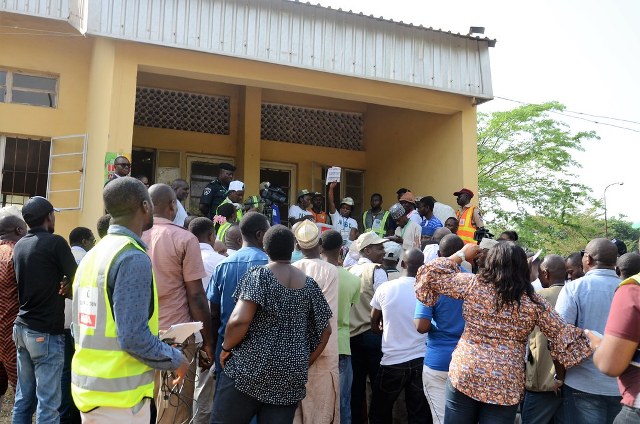 People queuing to vote in 2019 elections in Nigeria. [photo: Commonwealth Secretariat]
People queuing to vote in 2019 elections in Nigeria. [photo: Commonwealth Secretariat]
[This is an excerpt from an article in The Round Table: The Commonwealth Journal of International Affairs.]
It should be a matter of concern and sadness that the arbiter of the winners of general elections has, in Nigeria, moved from voters and the polling units to the courts of law. This development, if not urgently addressed, could threaten democracy and discourage voter turnout, which is already abysmally low. The highest court with jurisdiction over national assembly elections in Nigeria, the Court of Appeal, recently ousted 12 House of Representatives and 5 senators. In another twist, the Court ousted 16 Plateau State House of Assembly members after removing 2 senators and 4 House of Representatives members from the same state. This tsunami of ousters hit all the major political parties in the country. Unfortunately, the electoral law and Nigerian constitution also have their parts to play in this development, while the Independent National Electoral Commission (INEC) cannot be absolved of blame either.
The Nigerian constitution’s Sections 239 and 285 give election tribunals the powers to adjudicate over electoral disputes for the office of president, governors, members of the National Assembly, and State House of Assembly. The tribunals have the power to hear election petitions brought directly before them. In addition, they also possess the power to consider appeals from rulings made by subordinate tribunals. Petitioners have 21 days from the day an election result was declared to file their petitions. In light of this, a number of parties filed petitions shortly after the 2023 general elections to contest various election outcomes. An election may be challenged for the following reasons: the candidate was unqualified at the time of the election; there were corrupt practices and violations of the electoral law; or that the declared winner did not have the majority of lawful votes.
Research Article – Digital technology and democracy in Nigeria: a study of how technology is transforming elections without necessarily deepening democracy
Opinion: Nigeria and the flawed 2023 elections
The court cited several reasons for the mass removal of declared winners, including failure to adhere to the Electoral Act, disregard for court orders, lack of political organisation, over-voting, and issues with the margin of lead. All these disputes revolve around internal party democracy, robustness of electoral laws, and the integrity of the election management body. A significant number of political parties in Nigeria exhibit a deficiency in internal democratic processes. They frequently establish rules hurriedly but then soon disregard those rules. The judiciary cannot really be blamed. When political parties fail to adhere to internal democratic procedures, it has a detrimental impact on other electoral processes. Nigerian state governors have a huge influence on party politics. Due to their role as key political party financiers, governors tend to influence party policies. At the expense of other party leaders and organs, they influence party executive elections, party ad hoc delegates at primary elections, candidates at elections, etc. Most Nigerian political officials transfer allegiance to their ‘godfathers’ instead of the party. This is because godfathers have undue influence on the party due to their financial contributions.
Furthermore, the electoral process relies on electoral laws. Therefore, poorly-drafted or poorly-enforced laws are likely to produce undesirable electoral results. This highlights the importance of firm and fair electoral legislation in ensuring credible elections. However, the biggest hurdle to legitimate elections in Nigeria may be developing effective measures to enhance state institutions so that they can withstand the pressures democracy brings with it.
Toba Paul Ayeni is a Doctoral Student at Afe Babalola University, Ado Ekiti, Nigeria.



